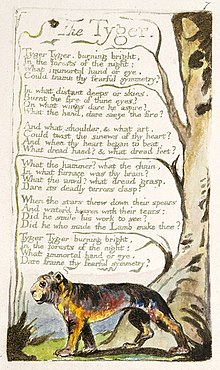Engelse literatuur/The Tyger
The Tyger is een gedicht van de Engelse dichter William Blake. Het werd gepubliceerd in zijn verzameling Songs of Experience van 1794 en is een van de bekendste en meest geanalyseerde gedichten van Blake. The Cambridge Companion to William Blake (2003) noemt het "the most anthologized poem in English."

De meeste moderne bloemlezingen hebben zich gehouden aan Blakes keuze voor de archaïsche spelling "Tyger", hoewel het reeds in Blakes tijd lichtjes verouderd was. Zijn keuze voor "Tyger" wordt meestal geïnterpreteerd als zijnde voor het effect, wellicht om het beest een exotisch tintje te verlenen, of omdat het helemaal niet om een tijger gaat en een metafoor is.
"The Tyger" is het 'zustergedicht' van "The Lamb" (in Songs of Innocence), dat soortgelijke ideeën weerspiegelt vanuit een ander perspectief, nu meer gericht op goedheid dan op kwaad. The Tyger geeft ook de dualiteit weer tussen esthetische schoonheid en wreedheid. De spreker vraagt zich af of de hand die "The Lamb" creëerde ook "The Tyger" maakte.
Gedicht
bewerken- The Tyger
- Tyger! Tyger! burning bright
- In the forests of the night,
- What immortal hand or eye
- Could frame thy fearful symmetry?
- In what distant deeps or skies
- Burnt the fire of thine eyes?
- On what wings dare he aspire?
- What the hand dare sieze the fire?
- And what shoulder, & what art.
- Could twist the sinews of thy heart?
- And when thy heart began to beat,
- What dread hand? & what dread feet?
- What the hammer? what the chain?
- In what furnace was thy brain?
- What the anvil? what dread grasp
- Dare its deadly terrors clasp?
- When the stars threw down their spears,
- And watered heaven with their tears,
- Did he smile his work to see?
- Did he who made the Lamb make thee?
- Tyger! Tyger! burning bright
- In the forests of the night,
- What immortal hand or eye
- Dare frame thy fearful symmetry?